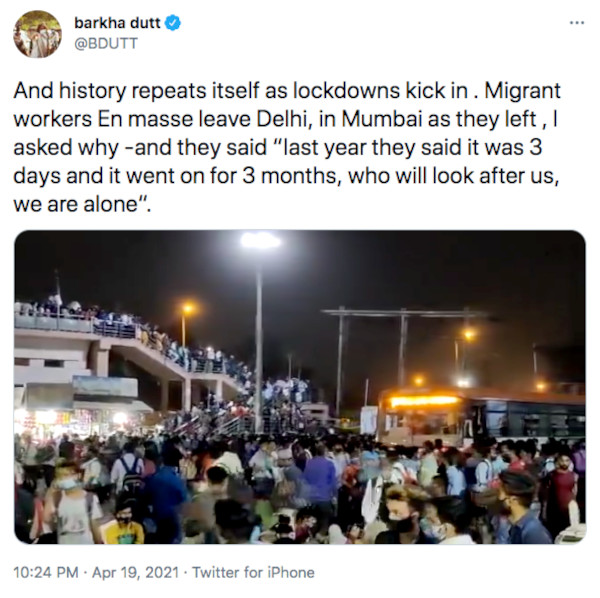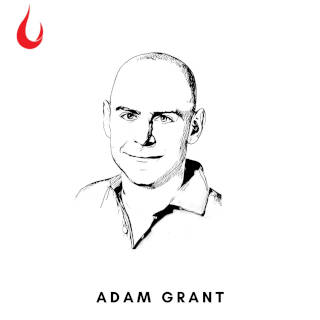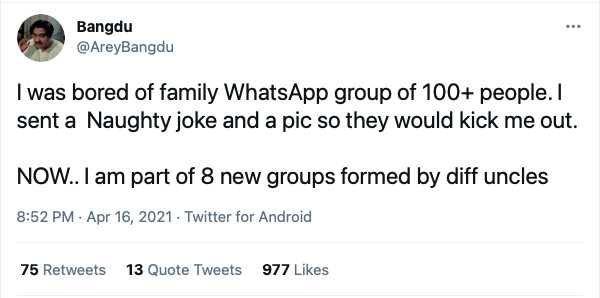[Photo by Rupert Britton on Unsplash]
Good morning,
Earlier this week, Krishna Jha, a Bengaluru-based fintech entrepreneur insisted we read Jeff Bezos’ final letter to shareholders before stepping down as CEO of Amazon. Jha had highlighted for us this part where Bezos speaks about why we must work extra hard to differentiate ourselves. The extract begins with Bezos quoting from a passage from The Blind Watchmaker by Richard Dawkins.
“Staving off death is a thing that you have to work at. Left to itself—and that is what it is when it dies—the body tends to revert to a state of equilibrium with its environment. If you measure some quantity such as the temperature, the acidity, the water content or the electrical potential in a living body, you will typically find that it is markedly different from the corresponding measure in the surroundings. Our bodies, for instance, are usually hotter than our surroundings, and in cold climates they have to work hard to maintain the differential. When we die the work stops, the temperature differential starts to disappear, and we end up the same temperature as our surroundings. Not all animals work so hard to avoid coming into equilibrium with their surrounding temperature, but all animals do some comparable work. For instance, in a dry country, animals and plants work to maintain the fluid content of their cells, work against a natural tendency for water to flow from them into the dry outside world. If they fail they die. More generally, if living things didn’t work actively to prevent it, they would eventually merge into their surroundings, and cease to exist as autonomous beings. That is what happens when they die.
“While the passage is not intended as a metaphor, it’s nevertheless a fantastic one… In what ways does the world pull at you in an attempt to make you normal? How much work does it take to maintain your distinctiveness? To keep alive the thing or things that make you special?
“We all know that distinctiveness—originality—is valuable. We are all taught to ‘be yourself.’ What I’m really asking you to do is to embrace and be realistic about how much energy it takes to maintain that distinctiveness. The world wants you to be typical—in a thousand ways, it pulls at you. Don’t let it happen.
“You have to pay a price for your distinctiveness, and it’s worth it. The fairy tale version of ‘be yourself’ is that all the pain stops as soon as you allow your distinctiveness to shine. That version is misleading. Being yourself is worth it, but don’t expect it to be easy or free. You’ll have to put energy into it continuously.”
Have a good day!
In this issue
- When crisis hits social welfare
- Feeling blah? Everyone feels it
- The truth about families
When crisis hits social welfare
As cities impose curfews, lockdowns and restriction on movements, we are, yet again, seeing the images of people going back to their towns and villages, indicating yet another migrant crisis. It’s deja vu all over again.

(Via Twitter)
In IDR, Rituparna Sanyal and Shraddha Shrivastava take a look at what happened to the public distribution system, and what one can learn from it. There are several lessons. Here we highlight two.
Piggyback: One unique innovation we have seen during the Covid-19 crisis is using the infrastructure of existing programmes, such as the PDS. For instance, the government of Bihar piggybacked on the PDS (one of India’s most extensive SP schemes) to provide a one-off transfer of Rs 1,000 to ration-card holders during the Covid-19 crisis. Although this experience saw challenges and swift course corrections, it needs to be systematically documented, for it will play a crucial role in informing future preparedness actions. Similarly, Uttar Pradesh and Odisha piggybacked on the extensive network of fair price shops to distribute food grains (in lieu of in-school cooked meals) to beneficiaries of the MDM scheme. Delhi and Kerala, on the other hand, used the fair price shops to distribute ‘essential item kits’. Leveraging existing delivery systems helped save crucial time and reduce errors in distribution.
Decentralise: Experience from the current pandemic response highlighted how federal limitations at multiple levels proved to be a hurdle for state governments. These included the inability to access funds to structure state-level relief packages, as well as curbs imposed by the public finance management system, which prevented swift payments. Furthermore, the differential treatment of the PM-CARES and CM Relief Funds (only donations to the former counted as Corporate Social Responsibility expenditure) also curtailed the states’ financial capacity.
Dig deeper
Feeling blah? Everyone feels it
With caseloads rising, and another lockdown impending, if there is one narrative we hear often, it is that people may not like the sound of it, or quite know how things may turn out, but they appear prepared for it. When probed on how, no clear answers emerge. What may the issue be? That is why Adam Grant’s most recent essay in The New York Times had our attention.

“When you can’t see your own suffering, you don’t seek help or even do much to help yourself.”
“It wasn’t burnout—we still had energy. It wasn’t depression—we didn’t feel hopeless. We just felt somewhat joyless and aimless. It turns out there’s a name for that: languishing.
“Languishing is a sense of stagnation and emptiness. It feels as if you’re muddling through your days, looking at your life through a foggy windshield. And it might be the dominant emotion of 2021.
“As scientists and physicians work to treat and cure the physical symptoms of long-haul Covid, many people are struggling with the emotional long-haul of the pandemic. It hit some of us unprepared as the intense fear and grief of last year faded.
“Languishing is the neglected middle child of mental health. It’s the void between depression and flourishing—the absence of well-being. You don’t have symptoms of mental illness, but you’re not the picture of mental health either. You’re not functioning at full capacity. Languishing dulls your motivation, disrupts your ability to focus, and triples the odds that you’ll cut back on work. It appears to be more common than major depression—and in some ways it may be a bigger risk factor for mental illness.”
Dig deeper
Still curious?
- The lockdown is taking its toll. What will it take workers in the informal sectors and small businesses to survive? Watch the FF Masterclass: Labour migration, jobs and society in the Age of the Pandemic
- Across Maharashtra, fresh farm produce was rotting after supply chains were disrupted by the national lockdown. The local administration in one of the districts offered a window of opportunity to small farmers’ collectives to build a farm-to-home model—and dramatically turn the tide, writes Anmol Shrivastava. Read: The Satara uprising
- Listening to the greatest Olympian ever offers life lessons that can be extrapolated into multiple domains, writes Charles Assisi. Read: The world as seen by Michael Phelps
The truth about families

(Via Twitter)
Tell us what you think and find noteworthy.
And if you missed previous editions of this newsletter, they’re all archived here.
Bookmark Founding Fuel’s special section on Thriving in Volatile Times. All our stories on how individuals and businesses are responding to the pandemic until now are posted there.
Warm regards,
Team Founding Fuel
(Note: Founding Fuel may earn commissions for purchases made through the Amazon affiliate links in this article.)


